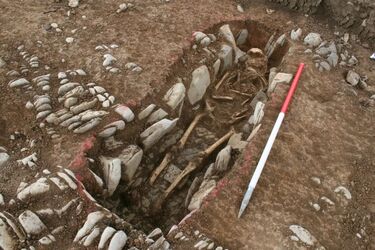Archaeologists find evidence of feasts in medieval cemetery in England (photo)

Archaeologists have discovered an early medieval cemetery on the grounds of Fonmon Castle in southern Wales. The cemetery, which is believed to date from between the 5th and 7th centuries, may contain up to 80 graves.
Excavations at the site over the past two years have uncovered numerous human remains, animal bones and various artifacts. The researchers conducted further radiocarbon dating and analysis of the findings, Newsweek reports.
Also read: Luxuriously decorated tombs from the 2nd and 4th centuries AD found in Italy
This research has shed new light on early medieval life in Wales, providing fascinating insights into the history of Fonmon and the region known as the Vale of Glamorgan.
"This is a really exciting discovery. Fonmon cemetery will allow us to learn so much about the people who lived here around 1400 years ago," said Andy Seaman, a lecturer in early medieval archaeology at Cardiff University in Wales, who is leading the excavation.
The cemetery dates from a "crucial" but poorly understood period in British history, the archaeologist said.
According to him, the find in Fonmon is a site that has preserved not only skeletal remains but also other artifacts. Thus, this place will help us understand this crucial period and allow us to use modern techniques "to tell the untold stories of the community living at this time."
Some of the human remains found in the graves that have been excavated so far show unusual features, such as a contorted body position.
Also read: Mysterious inscription on the ancient sphinx deciphered (photo)

Archaeologists believe the site was used for more than just burying the dead. Of the many fragments of animal bones they found in the cemetery, some show evidence of slaughter and cooking. They also found fragments of metalworking, as well as shards of rare imported glass drinking vessels - possibly of French origin - and ceramics, possibly from North Africa.
According to the archaeologists, some of the materials found at the site may be related to the rituals of feasting at the grave.
Archaeologists hope that this study, along with DNA analysis of the skeleton, will reveal more about the identity and life of the people buried at the site.
As a reminder, an ancient cemetery where fifty children were buried was unearthed in Turkey.
If you want to get the latest news about the war and events in Ukraine, subscribe to our Telegram channel!
